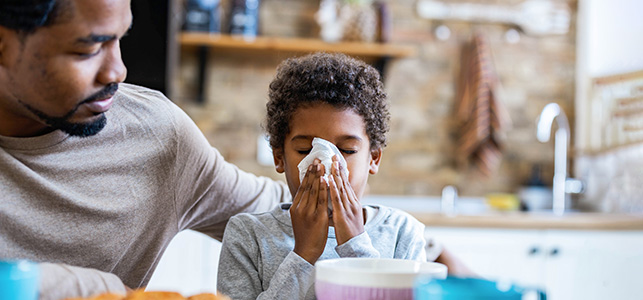Children's Emergency Department is now located in Children's Tower: 1001 E. Marshall Street.
Learn more
If sounds of coughs, sneezes and sniffles fill the air at your home, you might be wondering if your child has already brought a cold home from school. It’s certainly possible, but they could also be dealing with seasonal allergies.
Dr. Santhosh Kumar, pediatric allergy and immunology specialist, explains fall seasonal allergies and how to know if that’s what’s causing your kid’s symptoms.
The most common culprit for seasonal allergies in the late summer and fall is ragweed, which releases a fine, powdery pollen between August and November. Mold spores can also cause allergies to flare, especially in periods of high humidity and after leaves have fallen.
In the springtime, many people experience allergic reactions to tree and grass pollination.
Specific allergy symptoms vary from person to person, but common ones include:
The symptoms are similar, so this can be a tricky question, but there are a few symptoms that can help determine if your child is dealing with seasonal allergies or a cold.
Most mild colds and allergies don’t require a trip to the doctor. You know your child better than anyone, so if you have a concern, it never hurts to send a message through your patient portal or call to speak to the triage nurse.
Allergies to pollens usually don’t develop before the age of 2 and are more likely to show up when kids are about 5 or 6. That’s because people need to be exposed to allergens a few times to become sensitized to them. Reactions to allergens in the home environment, such as pets or dust, are often evident at younger ages because little ones are around them every day.
Seasonal allergies are the result of the immune system overreacting to pollen as an invader in the body and releasing histamine to overcome it. These histamines cause allergy symptoms. We don’t know exactly why not everybody overreacts this way to these “invaders,” but seasonal allergies do tend to run in families.
Not all children with allergies will have asthma and vice versa – but if a child’s asthma isn’t under control, allergies may make it worse. Many of the same irritants, like pollen and dust, can cause both allergies and asthma to flare. If your child has asthma, make sure they stay up to date with their controller medication and see a health care provider for proper management.
Try these steps to limit their exposure to allergens, while still allowing them to enjoy some time outside.
A nasal saline spray can safely help relieve congestion and flush allergens. Oral antihistamines can also help alleviate symptoms by blocking the histamines causing the allergic reactions. Read the label closely to ensure proper dosing and learn about potential side effects. It’s a good idea to talk with your family’s pediatrician before starting any medications to make sure they’re safe for your child.